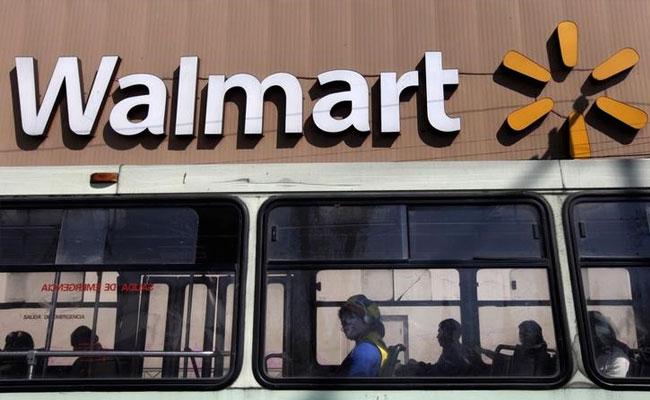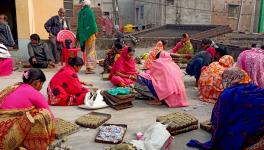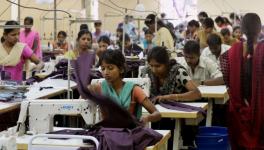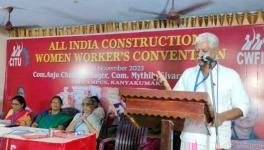Women Workers in Garment Factories of Walmart, Other Brands Face Violence Daily: Report

Image Courtesy: NDTV
Women working in factories in Asia (including India) that manufacture garments for global brands — retail giant Walmart and fast-fashion brands H&M and Gap — face gender-based violence on a daily basis, says new research by the Asia Floor Wage Alliance (AFWA).
The three separate factory-level research reports by the AFWA, in collaboration with other workers’ rights organisations, document the routine violence — from verbal abuse to sexual harassment and physical violence — faced by women workers in the garment supply chains of three firms.
Garment supplier factories in Asia are disproportionately staffed by poor women engaged in short-term, low-skill and low-wage employment under appalling working conditions. Most of them are in subordinate positions as operators of machines, checkers and helpers. Rarely do the women hold managerial or supervisory positions in these factories, says the research.
Conducted between January 2018 and May 2018, the research was undertaken for submission to the International Labour Organization (ILO), which has convened a Standard Setting Committee with the aim of ending violence and harassment inflicted on workers. Meeting from 28 May to 6 June, the committee will hold consultations to come up with global standards on women’s labour rights.
The research was undertaken in nine garment production hubs across five countries in Asia — Bangladesh (at Dhaka), India (at Bangalore, Gurgaon and Tiruppur), Cambodia (at Phnom Penh), Indonesia (at West Java and North Jakarta), and Sri Lanka (at Biyagama, Gampaha District and Vavuniya District, Northern Province).
The report on American multinational retail corporation Walmart — which has recently acquired Indian e-commerce major Flipkart, and is known for its atrocious labour practices — provides in-depth profiles of four of the company’s supplier factories in Bangladesh and Cambodia.
It describes the experiences of women workers at the base of Walmart’s supply chain, who are already under extreme pressure to complete impossible production targets. These include cases of women being pressured into sexual liaisons with men in senior designations and being fired on not responding to the sexual overtures, without any recourse to relief. Women have talked of facing routine physical violence “including slapping and throwing large bundles of clothes and smaller sharp projectiles such as including scissors”, verbal abuse and mental torture.
The report “provides an empirical account of the spectrum of gender based violence and risk factors for violence women workers face in Walmart garment supply chains.”
“The experiences of gender based violence in Walmart garment supply chains documented in this report are not isolated incidents. Rather, they reflect a convergence of risk factors for gender based violence in Walmart supplier factories that leave women garment workers systematically exposed to violence. Risk factors in Walmart garment supply chains are a by-product of how Walmart and other multi-national corporations do business,” the report says.
The Gap report presents profiles of nine of the company’s supplier factories in Bangladesh, Cambodia, and India. The H&M report presents profiles of the gendered hiring practices in six H&M supplier factories in Bangladesh, Cambodia, and India.
The three reports draw upon previous research by AFWA (2016) documenting human rights violations in the supply chains of the brands in south and southeast Asia (including Indonesia and Sri Lanka).
The H&M report highlights the ongoing struggle of women workers who are part of the Karnataka Garment Workers Union (KGWU), also known as Koogu, in India.
These women worker leaders faced physical assault, caste-based slurs and were fired after they pushed for the following demands: inclusion of an elected worker on the factory health committee to address water quality at the factory, steps to address irregular transportation to the factory, and negotiation to raise their wages that are currently below living wages.
The AFWA and the Global Labor Justice have demanded that H&M ensure that its supplier reinstate immediately the 15 workers who were fired for taking part in union activity, fire all those factory managers and senior staff who were involved in the attack on the women workers, as well as address the original demands of the Koogu union.
The reports also document the industry risk factors for violence faced by women workers in the global garment supply chain. These risk factors include short-term contracts, production targets, industrial discipline practices, failure to pay a living wage and other wage-related rights abuses, excessive working hours, and unsafe workplaces.
The Women’s Leadership Committee of the AFWA has asked Walmart, H&M and Gap to take the following action steps —
- Publicly support and commit to proactively implement an ILO Convention Recommendation on Gender Based Violence that includes the recommendations from the Asia Floor Wage Alliance and partners.
- Meet with the Asia Floor Wage Women’s Leadership Committee in the next three months to discuss the supply chain findings and next steps.
- Proactively work with the Asia Floor Wage Alliance to pilot women’s committees in factories that eliminate gender based violence and discrimination from the supplier factories.
Get the latest reports & analysis with people's perspective on Protests, movements & deep analytical videos, discussions of the current affairs in your Telegram app. Subscribe to NewsClick's Telegram channel & get Real-Time updates on stories, as they get published on our website.
























